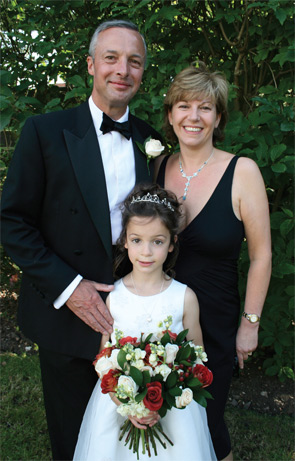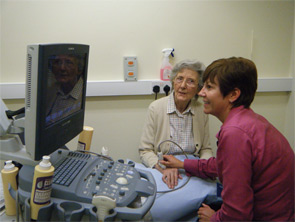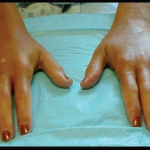As it turned out, there was no catch. Cornell and Dr. Thompson were meeting at a propitious moment. Dr. Thompson had, indeed, been planning to expand the concept of the rheumatology practitioner, using NHS nurses and physiotherapists who could take over the management of arthritis patients following their initial diagnoses. “I was looking for somebody to take that whole service forward from a nursing point of view,” he says.

For her part, Cornell had recently left Queen Alexandra’s Royal Navy Nursing Service, where as a lieutenant she had run a 100-bed orthopedic trauma ward and served time on board Primary Casualty Receiving Ship RFA Argus during the first Gulf War crisis. “I was looking around for what I wanted to do next,” she recalls. “I didn’t know much about rheumatology, but the position sounded interesting. So I applied for the job, and surprisingly, I got it! We had just got a new drug, leflunomide, and everything was just turning around in terms of what we could offer patients. It all got really, really interesting in rheumatology.”
Always Focused on Nursing
Although rheumatology wasn’t in her sights until the late 1990s, Cornell intended to enter nursing from a very early age. Her mother was a pediatric nurse and she recalls that she also wanted to be a nurse even at the age of eight or nine years. While in senior school, she began to explore her training options and took part in a work experience at a local airbase in Cornwall. Naval personnel advised her to train at a school of nursing and then join the Navy as a Sister [a rank in Queen Alexandra’s Royal Naval Nursing Service] so that she could enter as an officer. She became a Registered General Nurse in 1985 and in 1987, at the Bristol and Weston School of Nursing, got her specialization in orthopaedic/trauma nursing.
Her natural drive for new challenges bolstered her successful career with the Royal Navy Nursing Service. She supplemented her nursing expertise with leadership courses at the Britannia Royal Navy College. “I wanted to further my education because I was getting bored,” she says, “and I decided to get a management qualification.”
In October 1990, as the first Gulf War began to counter Saddam Hussein’s invasion of Kuwait, Cornell was deployed to the Persian Gulf to run the medical ward on board RFA Argus. She was in charge of the 75-bed trauma unit that received casualties picked up by the air support squadron. That six-month experience, she says, “made me think about leadership more, how to manage the department and manage staff.” Her guiding principle: “I don’t ask people to do something that I wouldn’t do myself. You always try to lead from the front.”

Those whom she has mentored will attest to that quality of leading by example. Jane SeQueira, a senior physiotherapist practitioner at Poole Hospital, says, “Trish has a lot of courage, and I think that’s just innate for her.” She and Cornell developed a clinic for AS patients modeled on the concepts for other inflammatory arthritis patients. “She came up with this concept because she’s got loads of ideas. That’s one of her strong points: She is a real idea factory,” notes SeQueira. After they began to see improved patient outcomes, Cornell encouraged SeQueira to develop her presentation skills so that they could present their results at the British Health Professionals in Rheumatology and later at the 2009 ACR/AHRP Annual Scientific Meeting in Philadelphia. “She has expanded me beyond the usual confines of physiotherapy,” says SeQueira. “You don’t often get opportunities like this, so I am grateful.”
The Whole Patient
Today, the rheumatology unit at Poole has six rheumatology practitioners. The roles for physicians and practitioners are quite specific. Once a diagnosis has been made, explains Dr. Thompson, the consultant makes sure the patient gets into the practitioners’ follow-up system. Thanks to Cornell, that system builds on the nursing and physiotherapy skill sets to holistically address patients’ needs, supplying education, follow-up, and ready access to the clinic when patients have questions.


